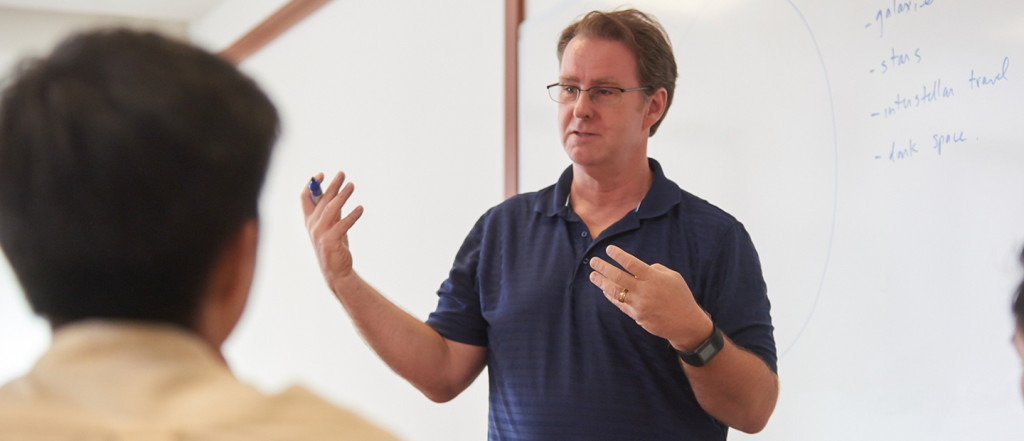In astronomy, research and teaching can collide

For Professor Bryan Penprase, the view of the Milky Way glimmering in the darkness of the night is one of the most beautiful marvels in the universe.
“That sight is something that can’t help but cause you to be stirred not only emotionally, but also intellectually,” said Professor Penprase, who is Professor of Science (Physics and Astrophysics) and Director of the Centre for Teaching and Learning at Yale-NUS College.
Aside from the visual spectacle, discovering how most fundamental questions of physics are tied to the origins of universe also contributed to his eventual falling in love with astrophysics.
Professor Penprase’s tendency to seek connections also led to his other current passion of exploring the interplays between research and teaching. This summer, he will be leading an undergraduate summer programme at the California Institute of Technology (CalTech).
Called the Undergraduate Astronomy Institute, the programme will bring together a group of 20 undergraduate students from liberal arts colleges around the world such as Yale-NUS College, Pomona College, Williams College, and a few other universities in the US, to conduct research on astronomy.
At the Institute, students will work together for a week and undergo an intensive introduction to different kinds of astronomy, before beginning on individual mentored research projects. They will also embark on field trips to visit the Mt. Wilson 60” telescope and Palomar Observatory 200” telescope as part of the experience.
The programme is currently funded by an US$8 million National Science Foundation grant for the Zwicky Transient Facility at CalTech. The Facility allows researchers to expand current capabilities of surveying the night sky on a regular basis using new cutting-edge technology. Professor Penprase is the co-investigator and person-in-charge of undergraduate programmes at the Facility.
Silvia Lara (Class of 2018), was the sole student chosen from a long list of hopeful Yale-NUS applicants to embark on the research programme.
“I would like to learn new mathematical techniques, understand how astrophysicists interact with each other, [and find] new and interesting answers,” Silvia said of her motivation to join the programme.
She hopes that she will be able to determine whether she should pursue astrophysics research in the future through the programme.
Professor Penprase highlighted that the programme is an “exciting way for students to gain international experience and do meaningful research at the same time.”
He added that while the science curriculum at the College is important as it prepares students to engage with meaningful research questions, conducting scientific research remains an essential component to truly understanding science.
“There is no such substitution for the experience of actually being in an environment where people are making discoveries and [are] really at the forefront of the field,” he said. “I see research as a necessary and vital supplement to the [Yale-NUS] curriculum, which adds meaning and authenticity to education.”
Professor Penprase’s passion for education has also extended to developing an observational astronomy course under the Global Relay of Watching Things Happen (GROWTH), a US$4.5 million project that seeks to create a global network of research and education in astronomy. As of this year, he is also supervising internships on global astronomy as part of this project.
His efforts in the field of higher education have been rewarded: Professor Penprase is the first faculty member from the College to be inducted into the National University of Singapore (NUS) Teaching Academy.
The Academy seeks to foster research on teaching and learning by creating more pathways for innovative teaching. This year, he was one out of only seven faculty members from NUS to be inducted.
Professor Penprase strongly believes that research and teaching can complement each other. He points out, for example, how the College’s focus on undergraduate students means that learning is always a two-way process.
“At a large university, you run off and do your research,” he explained. “At Yale-NUS, the feedback [from your student researchers] goes right back to the classes because you are already working with undergraduates.”





